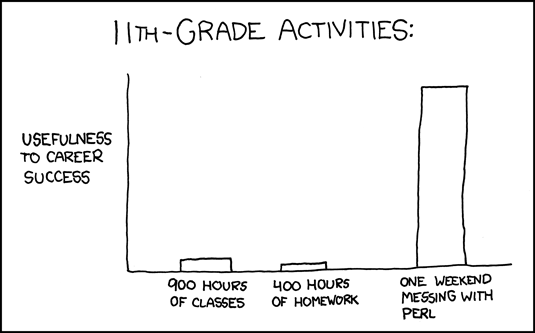No offense, but this post misses some important points. Scarsdale is one of the most well off school districts in the country.The problems with the AP curriculum and other breadth-intensive standardized tests isn't limited to just the best schools. To see why, think about why we even want students to study, say, history. Here's my short and inexhaustive list:
...
I agree, at a very high level of academic achievement, standardized testing winds up inhibiting the very best teachers and students.
...
But most schools aren't Scarsdale. These schools are not hitting the ceiling that standardized tests create.
- It allows them to draw lessons from the past to inform the present
- It develops their critical thinking, analytical, and writing abilities
- It helps them become better citizens
- It develops a foundation of historical and cultural literacy that enhances and informs future learning

The problem with standards requiring mastery of hoards of facts is that students spend too much time on remembering and understanding information, and too little time analyzing, evaluating, and creating it. This comic from xkcd illustrates my point:

Most people learn the most and learn most meaningfully when engaged in deep and interesting material, and when they learn by doing I learned more about politics and government from high school debate and mock trial than I did in US History or Government; I learned more about statistical analysis doing my undergraduate research than I did in econometrics or my political science research course.
History as an academic subject is valuable largely because of its applicability to the present. Robert Samuelson reminds us that the seemingly obscure theory of mercantilism informs current international trade behavior; a recently declassified history of the use of nuclear weapons informs our analysis of nuclear deterrence. And Thucydides' history of the Melian dialogue is still probably the best explanation of how states behave in the international system.
Learning history is not nearly as exciting or applicable when kids spend most of their time "remembering" and "understanding" facts. Granted, higher level analysis requres a foundation of knowledge, but the point is that current curricula have these out of proportion.
Many kids come in to high school with literacy skills too low to both (a) remember enough facts to pass the test and (b) engage in more meaningful learning. Student creativity, student led learning, and higher order thinking become the province of rich suburban kids. I think it's a worthwhile trade off to require a narrower breadth of knowledge for the sake of deeper learning.
But suppose that all kids came into high school with Scarsdale-like literacy levels. I know that at least for me, I would have preferred history classes that were student-driven and project-oriented. I would gladly give up 50% of the AP Euro fact-regurgitation requirement for projects allowing me to explore cool parts of history. Its easy to make the argument that this is what electives are for; but if you visit at an at-need school, you'll see that its hard to do this when there's so much institutional pressure to focus on the test.

Most people learn the most and learn most meaningfully when engaged in deep and interesting material, and when they learn by doing I learned more about politics and government from high school debate and mock trial than I did in US History or Government; I learned more about statistical analysis doing my undergraduate research than I did in econometrics or my political science research course.
History as an academic subject is valuable largely because of its applicability to the present. Robert Samuelson reminds us that the seemingly obscure theory of mercantilism informs current international trade behavior; a recently declassified history of the use of nuclear weapons informs our analysis of nuclear deterrence. And Thucydides' history of the Melian dialogue is still probably the best explanation of how states behave in the international system.
Learning history is not nearly as exciting or applicable when kids spend most of their time "remembering" and "understanding" facts. Granted, higher level analysis requres a foundation of knowledge, but the point is that current curricula have these out of proportion.
Many kids come in to high school with literacy skills too low to both (a) remember enough facts to pass the test and (b) engage in more meaningful learning. Student creativity, student led learning, and higher order thinking become the province of rich suburban kids. I think it's a worthwhile trade off to require a narrower breadth of knowledge for the sake of deeper learning.
But suppose that all kids came into high school with Scarsdale-like literacy levels. I know that at least for me, I would have preferred history classes that were student-driven and project-oriented. I would gladly give up 50% of the AP Euro fact-regurgitation requirement for projects allowing me to explore cool parts of history. Its easy to make the argument that this is what electives are for; but if you visit at an at-need school, you'll see that its hard to do this when there's so much institutional pressure to focus on the test.
When opponents of standardized tests come up with a better way to accurately and consistently assess student performance across schools, I'll gladly embrace it. Til then, I'll continue to support AP, SAT, ACT, NCLB, etc. - DankI agree we need easily comparable measures of student performance for accountability and resource sharing. I like how the AP Art exam requires a portfolio of student work; I think something comparable should exist for other classes. Standardized assessments can be modified to accommodate the outputs of constructivist learning in an objective fashion. As an idea of what this would look like, think about how theses and creating writing classes are graded. At my school, student project grades are determined by an average of many different teachers' rubric scores.




No comments:
Post a Comment